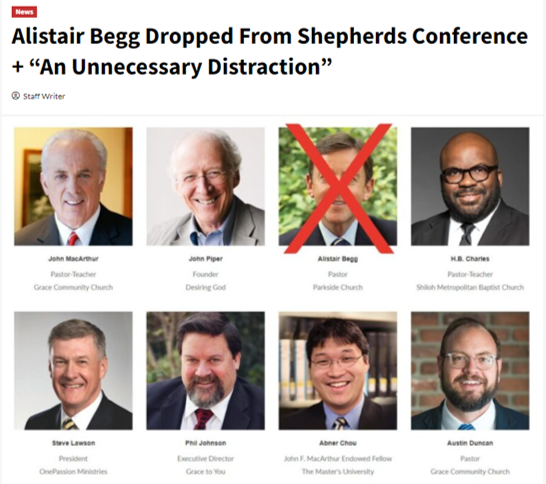From a distance, I follow a bit of what is going on in the Christian field. It's a lot and it doesn't make you happy. Writing about it is no pleasure either; frankly, it is beginning to bother me a little. But on the other hand, as a result of what I see happening, I discover new things in the Bible every time. This time again about a recent statement by John Piper. It also teaches us something again about 1 Corinthians 15, the resurrection of Christ.
The Shepherds Conference 2024
What struck me in recent weeks was what had happened at the Shepherds Conference 2024 held each year under the responsibility of the well-known John McArthur1.

The conference runs for three days and features a large number of speakers before an audience of about five thousand pastors and church leaders. As far as I know, the speakers and listeners are roughly in "the Baptist-Calvinist-evangelical" corner.
The first thing that stood out was that the well-known and widely loved preacher Alistair Begg, - who had been announced as one of the main speakers, was suddenly removed from the speaker list. It was about a pastoral advice Begg gave that "colleagues" disagreed with. The outcry that arose publicly over this was the reason that it was decided that he would no longer speak at the conference2. All I want to say about it here is that it is deeply sad that through such a controversy the Christian witness is being harmed.

As you can see in the picture, Begg has been dropped, but John Piper has remained. Now I don't feel the need to delve into all the speakers, but we have talked about Piper once before (see here). We then found that so-called "Christian hedonism" is really just a pagan practice wrapped in a Christian-sounding jacket.
The high word is out
About a year ago, we wrote about the meaning of the word "hedone" in the New Testament ( see here and here). We noted then - albeit a little tentatively - that it reflected a desire for sexual pleasure. You may have read that then and thought that this is probably a bit of an overstatement after all.
But now Piper has said it herself in a speech, and still at the Shepherds Conference 2024.
Piper talks about how a pastor must teach obedience to his people. But preceding that is love, because "if you love Me you will keep My commandments. Love precedes obedience. In this short piece above, he literally says the following:
“What do we want to achieve in the lives of our people? And everyone said: obedience. Me too, amen. But you had already quoted: if you love Me, you will obey Me. So I think, I'm out for love, people. And so are you.
And because that love, that love is not equal to obedience and that love is not equal to agape, that love is erotic to the bone. That's a bit of an exaggeration. Eros means I find pleasure in You, Jesus. I find pleasure in You, Jesus.
You are my preciousness. And then comes obedience.”
Erotic to the core: unification with God
When Piper characterizes his relationship with the Lord Jesus with this statement it is 'erotic to the core' it confirms what we have already discovered on the basis of the analysis of the concept of hedonism. It is pure idolatry: a relationship with God (or better: god) that you physically experience as an intense love affair.
It is nothing other than what is seen in contemplation as the highest step of spirituality: union with God. In Roman Catholic thinking, it is the only true Christian experience. We have already written more about this, as for example here:
- Ann Voskamp's quest, ending in Roman Catholic contemplation: see here.
- The gospel of contemplation proclaimed: another gospel. See here.
- On so-called Christian meditation: see here.
Piper's Christian hedonism, by the way - albeit in somewhat different words - is the same as taught by other "Calvinists" in the "Behold Your God" course (for the description here). We have seen in discussing this how closely it is related to Roman Catholic spirituality and mysticism.
Fellowship with the demons?
Of course there are all kinds of discussions on the Internet about Piper's statement and everyone has an opinion about it. He will not have meant it so literally, surely he is a phenomenal preacher? Surely he is very "Christo-centric" in his preaching?
But little do you hear about what is really going on with Piper. About what the Bible understands by the love of God - see, for example here - And how contrary that is to the eros Piper is talking about.
Even less, by the way, do you hear about idolatry and the work of demons in the soul of man. The apostle Paul knew about it like no other and he writes about it in almost all of his letters. In the first letter to Corinth he warns extensively against it (chapters 8 through 11 - see also here) and makes the poignant statement: 'I do not want you to have fellowship with the demons' (10:20).
But it is a message that is not understood in Christendom. It is the same message that the people of Israel also disregarded; with all its consequences.
It is the massive apostasy from the Christian faith that is going on because we do not understand what idolatry is and therefore do not discern it.
The resurrection of Christ
Idolatry is when people believe they can perceive God with their physical senses (hearing, seeing, feeling) and desire it. In the first letter to Corinth, Paul discusses what is pagan and what is spiritual. This is necessary because of the danger of bringing pagan views and practices into the church. Therefore, he writes about it at length in the letter (from chapter 8 through 15).
He makes clear what is spiritual and what is pagan. It means that with and in our bodies we cannot experience God and heavenly things.
In that context, it is interesting that at the end of his discourses he discusses at length the resurrection of Christ (1 Corinthians 15). The chapter makes two things clear.
- the resurrection of Christ is an event that actually took place in time, of which there are also witnesses. He rose bodily and is now in heaven as a Man. He is not a spirit who is now in heaven, but a human being with a body. Therefore, the resurrection of human beings after death is also something very real. It is not that man lives on as a spirit and is then united with the "Christ spirit. These are ideas held by many in Christendom as well. But verses 1 through 34 make it conclusively clear that that is fallacy, which we must reject.
- The second part of the chapter (verses 35 through 58) makes clear the distinction between the earthly body and the heavenly body. As long as we are still here on earth, we are in a perishable, earthly body. That is a body that Paul also calls "body of death" (Romans 7:24). That body cannot yet experience the heavenly glory. It must first be changed into a heavenly, glorified body.
When Christ comes we will be changed and the dead will rise. Only when death is devoured and conquered will we receive that heavenly body!
We look forward to that moment when the Lord Jesus comes, the trumpet sounds, the dead will rise, and we will be changed! (15:51,52).
Then we will see Him who died for our sins! We look forward to it and until then we depend on His grace.
The grace of the Lord Jesus Christ be with you.
1 Corinthians 16:23
Footnotes
- See Wikipedia: https://nl.m.wikipedia.org/wiki/John_F._MacArthur ↩︎
- https://religionnews.com/2024/01/31/radio-preacher-alistair-begg-wont-back-down-from-advice-to-attend-lgbtq-wedding/ ↩︎



